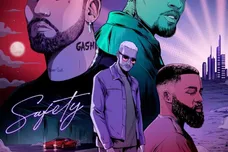As much as we think times change, they really don't. We like the music we like, regardless of what our parents think. Then something even newer comes out, and we say it isn't as good as the old days. It's the circle of life, and the music industry should've seen it coming. Why wasn't the industry, for the most part, ready for the internet, and all the challenges that came with it? If we know that video killed the radio star, why were the masses shocked when Napster crumbled brick and mortar record stores, or when YouTube killed MTV? It was the changing of the guard, and we're only just now seeing the true effects of the internet revolution on music, and in hip hop especially.
Like anything, there are pros and cons to the effects of the internet on music today, and for every proponent of it, there are also detractors. For example, while the internet has made every artist readily available to us in the form of not only music, but their personal lives via social media, it has also hindered them by creating the paparazzi and celebrity worship culture they must live with around the clock. Sure, they make a lot of money to live their dreams artistically, but they are hounded by photographers, so we can know what they're up to on a Saturday afternoon when they are out running errands with their kid.
On the other hand, as far as hip hop goes, the internet was the greatest thing to ever happen to the genre in its short but storied history. It's allowed it to become by far the most most productive, and subsequently influential, genre in music today. Think about it, you are spending a significant amount of time out of your day on a site that's main purpose is to relay the most recent news in hip hop only. If there's a HotNewBluegrass website, I haven't found it yet. It goes to show that as music listeners, we've evolved along with the music industry, from people that were content with hiking down to the record store to get the newest album from our favorite artist once every year or two, to people that crave all the newest music every single day. In a way, it may be unfair to place that kind of constant pressure on these artists, but shit, it's working. We're constantly getting groundbreaking new music, new artists that consistently shatter old records, and a steady stream of high quality music that is usually free. It isn't all good, the internet age has definitely watered down the talent pool in music. This occurred when every kid and his brother gained the ability to create, market, and distribute their music all from the friendly confines of their mom's basement. While we need more teachers, engineers, and factory workers all the time, the country has never experienced such a surplus in aspiring rappers as it has now.
Hold on, let's take another listen to this kid. This is the internet's fault.
So while we have the internet to thank for subjecting us to poor Crimson's music catalog, it has also shone the light on plenty of monumental artists that we may have never heard without the help of social media and the blogs. For every Crimson (sorry to pick on you kid), we get a Mac Miller or Chance the Rapper. These are artists that have avoided the traditional method of obtaining music superstardom (and may not be tradiotional MCs either), bucking major label influence to remain at least mostly independent, giving us fans a much more transparent and authentic product, and a truer representation of them as artists. Those two are just a miniscule sampling of all the great artists we've all discovered through the internet. The world wide web gives us the ability to ignore what a label or marketing firm wants to load into iPods, instead searching for ourselves, uncovering every nook and cranny of the internet to find gems like Kevin Abstract or J $tash.
The internet doesn't even discriminate when it comes to giving shine to deserving artists. Besides all the new artists that use the web to their advantage, there's been a ton of artists who, for one reason or another, hadn't found the success they'd sought until the internet provided them the necessary outlets to connect them with their newfound fans. Look at an artist like Danny Brown, who stayed on his grind for years, even when the conventional thinking (cough * G-Unit * cough) dismissed him. He kept at it, eventually releasing his project XXX for free via the internet, which was able to put him back on the map, and expose him to a massive new fanbase of people who liked him just the way he was. People say the free music trade that our generation has created is killing the musician's bottom line, when in reality it's done the opposite for the truly great ones. Hip Hop artists today give away the majority of their music for free (unless said artist is on TDE), so to compensate for lost revenue on the retail side, they tour constantly and start other ventures like labels. With artists hungry to keep these new revenue streams alive, it forces them to tighten and perfect their stage show to continue selling tickets that put food on their proverbial table. They also tend to create these umbrellas under which they develop their own hand-picked stable of protégés, which also benefits the fan, as we'd rather have an artist we love help pick the next crop of talent than some old white man in a suit. All in all, it forces these artists to perfect their craft and keep working to earn each and every fan, ensuring that they've made enough of a connection that you'll still buy their next retail release when it comes out, trusting that you truly appreciate the two free mixtapes and tours that artist gave you in the last year. It's a risk, but one that seems to be paying off for the artists willing to work for it.
The artists have a lot to be thankful for in this area, as fans are more enthusiastic than ever. Commenters come on this site and others every day to defend their favorite artists to the virtual death. It's true appreciation and a common understanding of mutual benefits that drives the hip hop industry today. The fans benefit by getting most of their music for free, and the artists benefit by reaching far more people than they would have otherwise. The artists trust that we appreciate all this free music and will reciprocate the gesture by supporting their commercial releases when available and buying tickets when they stop in our hometown. It's a system that seems to work, as the live concert industry is booming, and record sales and paid music subscription services alike seem to be on the incline every year since the crash in sales the industry experienced the last decade or so. Plus, we've moved past the awful-vocals-drowned-in-bass-with-eight-hypemen-era of live concerts in the early 2000s to the current era when artists take real pride in their stage shows, giving us classic performances like the one below. Head to the 46:00 mark to see just how strong the connection between artist and fan has become (we really mean sorry for making an hour of your day disappear because this video is a classic).
All in all, it is impossible to know what the music industry landscape would look like without the internet having redirected its trajectory forever. What can be said, however, is that we're right in the middle of (another) golden era for hip hop, and the internet has played a massive part in that. There were skeptics in the beginning, but the detractors are slowly but surely realizing that what they once thought was the death of the record business was actually its saving grace. So download your free mixtapes, and troll away in the comment section asking why The Based God isn't on every list, but just know that you're the gears that now run the massive engine that is the music industry, and you shouldn't want it any other way.







